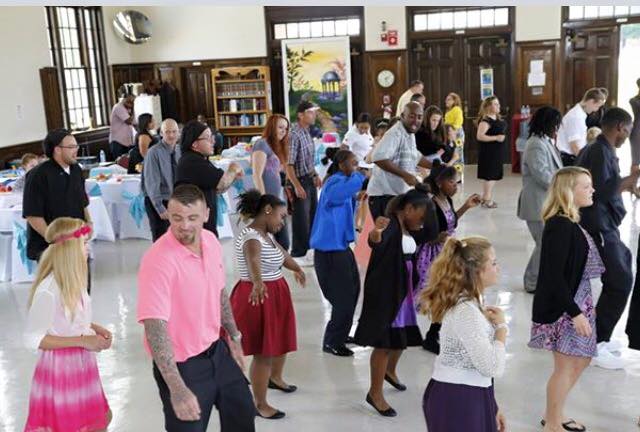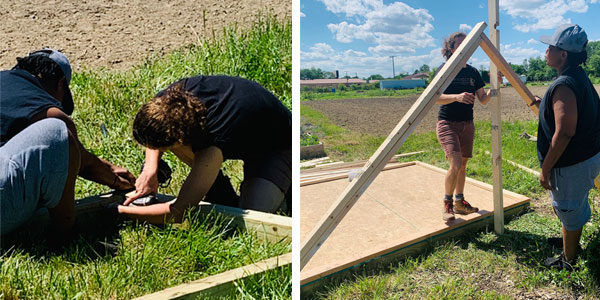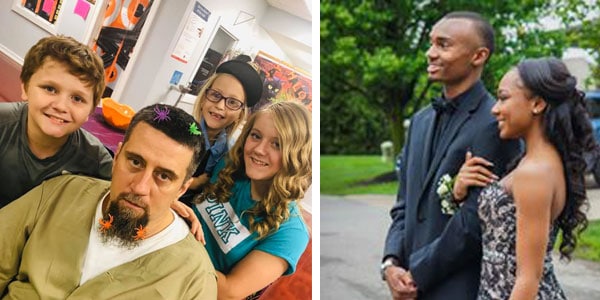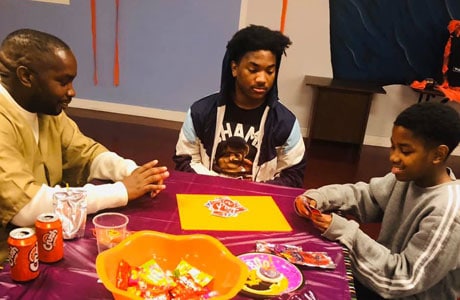By Lynn Sygiel, editor, Charitable Advisors
Last year, nearly 10,500 adults were released from Indiana Department of Correction’s custody. In Marion County alone, 2,485 adults, of which 203 were females, rejoined the community.
While some find programs that help with their re-entry, other former inmates struggle. According to research, however, adults who find immediate, comprehensive support that focuses on transitioning ex-offenders back into society, have dramatic reduced rates of recidivism.
In Marion County, the Re-entry Coalition run by Community Solutions provides a connection and network for county re-entry programs. Lena Hackett, president and founder of Community Solutions, a community development consulting firm, has worked with well-established nonprofits that do this type of work, but has seen start-ups get in the game in the past several years. The coalition convenes monthly working groups and a two-part, large-group quarterly meeting that opens with work groups sharing results, and then sharing information and providing education.
“I know that there are people who have different beliefs or different values, but we’re still all working, using our resources, our networks, to say, ‘How do we make this change?’ It’s pretty exciting,” said Elizabeth (Liz) Wallin, founder of Project Lia, which supports women exiting the correctional system.
Wallin is one of several founders of start-up efforts. Ericka Sanders works with dads inside Putnamville Correctional Facility and founded YouYesYou! to keep dads and daughters connected. Nick Greven is interim director of FOCUS Initiatives, which began as a correspondence project in Bloomington and is just getting started in Indianapolis. His group, which is not yet a part of the Marion County Re-entry Coalition, will provide former inmates with a range of services and eventually will be run by the four inmates instrumental in getting the program off the ground.
All believe in the importance of building trust.

Project Lia
Wallin, who grew up in Queens, New York, came to Indianapolis in 2016 for an internship at Mundell and Associates. Her quest was to learn about the Irvington company’s profit-sharing model. As a member of the Economy of Communion network, the environmental company divides its profits in thirds, a portion going to the community, a portion back into the business and the remainder to a general global fund. During her time in Indianapolis, she also volunteered with a group involved in a mosquito netting project at the Indiana Women’s Prison.
As a result of that connection, she started doing research into the root causes of female incarceration. She also started mapping the re-entry programs available in Indianapolis for women.
“I was very much looking at it like an analysis and trying to dig for data (to determine) would that be a sustainable project to take outside of the prison walls, so that when individuals return to the community, they would have that skill set and could plug right in as they gained some sort of stability. I was looking at it purely in a data-driven way.”
And that’s when the idea of Project Lia developed, said Wallin, founder and executive director. When her internship finished, Wallin stayed in the city, and with some of Economy of Communion funding, jumpstarted the program which is named for an Argentinian woman who dedicated her life to building bridges between races, cultures and religions.
Just under 10 percent of America’s prisoners are women. While men and women returning face some common challenges, some other barriers vary by gender. Women are statistically more likely to be expected to care for children or other family members. The basic premise is to help women rebuild their lives after incarceration.
The program’s length is designed to be six months to a year. As advancements are made through technical skills and the life skills program, job titles and pay can also advance. The goal is to make a successful transition to a long-term career opportunity. Along the way, program participants receive instruction in financial literacy, communication, business ethics, and health and wellness, and receive support for a future job search. As part of the process of rebuilding their lives, the women reuse discarded materials to design and build furniture and other items that contribute to the nonprofit’s revenues.
Word of the program is shared at the Women’s Prison, and last fall, “New America” produced a piece for the Atlantic that shared its mission and plans for scaling.
“It’s a pretty exciting moment. I think it also helps us in building our credibility as an organization and the work that we do. Because many times, it’s a hard sell — that very emotional, relational work that happens in community organizing and community development,” said Wallin.
Atlantic: Rebuilding after incarceration by James Fallow.
(Oct. 7, 2019)
“We’re creating taxpaying individuals, productive individuals, but that work only is sustained through relationships. It only really changes a long-term impact if you build those relationships and invest in the other. And that story’s hard to sell because it can be expensive and it’s messy. It doesn’t look like what you want it to look like, it looks like what it looks like.”
Besides funding from Economy of Communion, the nonprofit has received funding from the Plus Program, and is working with the Department of Correction to determine if a grant is feasible. Revenue from products and projects has been another source of income.
Just before the shelter-in-place order, Timesia Keys was hired as the full-time operations manager. During the pandemic, Wallin said it has not added any participants to the program, but applied for and received assistance from the Paycheck Protection Program through LISC and its landlord has provided some rent relief.
Some of the ways Wallin said the program measures success is to look at savings and checking accounts and financial management before and after the program.
“The career pathway we take is on a very individual basis. It’s like: ‘Where do you want to go? What do you want to be doing?’ and then we work on that,” Wallin said. Wallin also tries to connect women to community resources.
Joyce (using only her first name here) has been in the program for about six months and found it through PACE. Besides upholstering, she’s learned to fix windows, since a revenue generator for Project Lia is repairing all the transom windows in the Circle City Industrial Complex where the program is housed. But at her core, Joyce is a true leader. She is hungry for knowledge about the administrative side of a nonprofit, because she wants to start a transitional home for former women inmates.

Wallin said the program’s first employee is now a manager at a Bloomington beauty salon and has just purchased her first house.
“It’s exciting to be part of her life. She was at that point in the program helping us, more than we were helping her, it felt like. Love her story.”
But at the core, Wallin, who has grown up with people investing in her development, believes it is about social justice.
“I believe strongly in our ability to create a united world and peaceful communities. In loving the other, it is hard and simple at the same time — simple concept, radical implementation. So that’s sort of what’s my guiding post and how do we fight for equity for all,” she said.
Project Lia
WHO SERVED: Women over 18 who have been incarcerated.
WHAT: Social enterprise, started in 2017, working to address economic barriers to re-entry success. Participants develop workforce skills by repurposing discarded material into furnishings and accessories. Participants are paid $10 an hour to start, and after a three-month evaluation, earn $11, and eventually top at $12, and get help opening savings and checking accounts. The John Boner Neighborhood Center offers participants financial literacy and management support.
PROGRAM GOAL: Help women become self-sufficient, build a resume and. According to Project Lia’s mission statement: “We exemplify an inclusive local economy and ultimately help our participants become self-sufficient and valued members of society. We aim to create a space of understanding and mutual respect – a space where transforming material, transforms lives. Using excess materials growing the business and organization step-by-step.”
LOCATION: 1125 Brookside Avenue, Suite C1, Indianapolis, IN 46202.
Before Covid-19, purchasing items designed and made by the women were available in a small shop onsite during the week, and at area farmers’ markets and festivals. In the interim, online shopping is available.
COMMUNITY INVOLVEMENT: Volunteers have shared skills, like woodworking and sewing, donated building materials like lumber, tools and fabric and glass jars.
FOR MORE INFORMATION: https://www.projectlia.org/
YouYesYou!
Every year, Ericka Sanders and her husband start their year setting goals. But 2014 was different. That year, she decided this would be her year to “to do something.”
A friend read a story about a father-daughter dance at a Virginia prison. That project idea didn’t go away. Sanders had grown up without her father actively in her life and was driven by a desire to help daughters have an experience that she didn’t have. She decided that a father-daughter dance could be her “do something.” According to a 2017 Incarceration to Reentry study in Indiana, 70 percent of people coming out of prison are parents, and the collateral consequences are often intergenerational.
By November, she had pulled together a first event at the Indianapolis Re-Entry Educational Facility on the Near Eastside. At that dance, 26 estranged fathers got the chance to reconnect with 37 daughters, as young as 2 and as old as 29.
By 2016, Sanders established a nonprofit, YouYesYou!, and began building relationships between incarcerated fathers and their daughters, which now includes programming inside prison facilities. A former Indianapolis Recorder reporter, now working full time for Simon Property Group, she has found the time to grow the program beyond the dance.
Besides the father-daughter annual dance, there are Halloween parties for families and their dads, monthly book clubs and workshops designed for the incarcerated fathers that introduce them to organizations focused on re-entry, rehabilitation and other activities. Additionally, on the outside, families build relationships by attending events like basketball games.

Those monthly Saturday book clubs allow time for the dads to talk and learn to build relationships with each other. She arrives with three or four questions about the book and inspirations that can be drawn from the text and asks if the inmates see themselves in the book’s characters.
“A lot of the times, the stories that we read are stories of triumph. Stories of people who have been dealt the most terrible hand but somehow, some way, they made it through. We talk a lot about the future and about dreaming. They don’t like to think much about that. But I kind of force them to do that because it’s important,” Sanders said.
But mostly she said, they just talk and learn a lot about each other.
“They’re pretty vulnerable at this point. By the time they’re in book club, they know me and they trust me. We know what each other is going through, so when we’re reading these books, we’re drawing from all of those different things.”
Sanders also encourages participants to thank whoever is taking care of their kids while the participants are incarcerated and to advocate for each other. Many guys, she said, are so much closer and are friends who hold each other accountable to stay out of trouble.
“The fathers in my program have made terrible, terrible decisions, multiple, multiple times. But they are human beings, and they are people, and sometimes if you just sit and you listen to their stories and you listen to their life and the brokenness that they come from and the things that they’ve had to deal with, you can kind of understand why they made some of the terrible decisions that they made.
“I really think that connecting them with their kids is the push that they need to be on good behavior and the push that they need that when they’re released, they will not come back. That is the basis of what we do.”
“A YouYesYou! father who getting out of prison has confidence, they believe in themselves. They’ve healed some relationships. They’re just different people. I hear that all the time. Basically, it’s just believing in them. It is so important that I get across that what we do is that we just believe in them,” Sanders said.
Earlier this year, she received a $50,000 United Way’s Innovation Award and is using part of the funds to hire a consultant to strengthen and grow her board. Plans are also underway to grow the program with the addition of the program at Plainfield, but the Department of Correction requires programs to be similar. So Sanders started her year honing the activity specifics, re-entry organizations’ workshops and the book club. Christamore House has plans to add a re-entry program, and YouYesYou! will collaborate and handle the family-engagement workshops to keep families of incarcerated engaged and connected.
She is still in communication with the Plainfield facility and Christamore House, but with the pandemic, expansion plans are on hold. The time has afforded her the opportunity to recruit a three-member working board which is scouting for additional members, and fine-tuning the program’s syllabus.
“Families of incarceration are often forgotten about. I think often people don’t realize the impact that incarceration has on families. What I’ve found, just the communication that the kids have with their dads, it helps the family all the way around,” Sanders said.
In five years, she sees the program expanding to more facilities and doing more family engagement activities in community centers.
“(The key is) to be able to just keep those families connected,” Sanders said. “The easy part is being in jail, if you want to be real about it. You know some guys are terrified to come out of prison. I would love to be able to share my blueprint with other individuals in Indiana and with other prison facilities and other states. It doesn’t have to be me running this program, it can be done anywhere, everywhere.”
She doesn’t want anything in return, she just wants them to be great dads. “Because by being a great dad, you’re not only helping yourself and your kids, but you’re helping their future.”
YouYesYou!
WHO SERVED: Fathers at Putnamville Correctional Facility, a medium security correctional facility. First father-daughter dance in 2014. Started at Putnamville in 2018 with 20 dads and ended up with 10; in 2019, 23 dads in the program, ended up with 21; and in 2020, the prison had 225 applications and selected 30. Those 30 are still involved. To date, eight have been released from prison and have not returned.
WHAT: Two-year project. Features workshops provided by re-entry organizations, like PACE, Recycle Force, EmployIndy, Goodwill’s New Beginnings and CareSource, which provide connections on the outside to employment and services. Fun activities with kids – father-daughter dance, Halloween party for daughters and sons and a family back-to-school event in August to maintain connections to family. A monthly book club that begins in November. When the program wraps up, the majority of dads are either out or on their way out when the program wraps up.
PROGRAM GOAL: To support the relationships between incarcerated fathers and their children by offering fun and engaging programs inside prison walls.
LOCATION: Putnamville Correctional Facility, 1946 W. U.S. Hwy 40, Greencastle, IN
FOR MORE INFORMATION: https://www.facebook.com/youyesyouproject/
http://youyesyouproject.com/?fbclid=IwAR1IMdkbcb-1RKcVNu3hupiF9kk9Z8pgoVEDzQK1ymMEX7KwOAPL6qugAno
FOCUS Initiatives
Nick Greven has had firsthand experience with prisoners who struggle outside prison walls. His involvement started five years ago when he helped start IDOC-Watch. It’s a watchdog group that corresponds with inmates, particularly those who have been incarcerated for lengthy periods of time. While IDOC-Watch started in Bloomington, it now has about 50 people involved in chapters in Indianapolis, Gary, South Bend, Evansville and Fort Wayne.
Through contact, the group came to a greater understanding of incarcerated life and potential need for increased support. And what it also learned was that for individuals who have been incarcerated for decades, there are enormous challenges to reacclimate to life outside prison walls. Often, they have lost contact with their prior support systems, particularly if they were incarcerated at a young age. For those with little experience outside of prison, navigating the world is new and finding stable housing and employment are among their significant hurdles.
The urgency of creating FOCUS Initiatives became clear when Faheem Shabazz (formerly Jerry Smith), incarcerated as a teen, was released from prison in 2018, and efforts were made to help him navigate the hardships of re-entry. He had been corresponding with IDOC-Watch.
“I was trying to help him get on his feet,” Greven said. “He was locked up in adult prisons when he was 14, and been in prison for 20 years, actually growing up in prison. He was ill.
“It was just really hard for him to get on his feet. Impossible to find a place to rent and was really hard to find a job. Unable to find consistent work, he was staying with his mom, and it wasn’t going well. He just didn’t really know how to exist in the world.”
What he needed, the group realized, was sustainable support until he got to a position where he could take care of himself. This experience to help Shabazz resulted in FOCUS Initiatives that was designed by a team of current and former incarcerated individuals in collaboration with community allies. Not created in isolation, it drew on models like San Francisco-based Planting Justice and a Los Angles program for women, A New Way of Life. FOCUS Initiatives launched in 2019, and stands for Forever on Course United in Solidarity.
Shabazz is currently incarcerated on a technical parole violation at Westville Correction Facility in Westville, Indiana. Greven’s hope was that he would be more involved if he was released in March, but parole was denied.
“He’s been involved to the extent that he’s able to while incarcerated, but it’s pretty difficult. Anything that is time sensitive or detailed is pretty challenging,” said Greven, who is serving as interim director until the men are released from DOC custody.
“I’m the interim director until people are ready to take it over fiscally. We have people who are planning on doing that and get on their feet. Four people who are close collaborators on the project are getting out (of prison) between now and June,” said Greven.
“They have like some time to adjust, get their feet under themselves. A period of months to get used to be in a world outside of prison before there’s any financial pressures. The first step is getting people what they need to survive without having to be under a lot of stress when they first get out. And then also having a supportive community, especially of people who have been or had similar experiences around them to where they can consult with each other about what they are going through. There’s all kinds of PTSD and prison has all kinds of psychological effects. People who have not been in prison cannot understand how it affects someone,” said Greven.
The first phase is to buy a house that will be available for two to five former inmates. The house will have a group counseling space with a re-entry circle. It can also host formerly incarcerated or family members for get-togethers. It will be a place for several to live and work to organize the rest of the program. The group has been looking at the Eastside, east of Rural Street, to find affordable property that meets the program needs. The group has plans to start a business in the second phase.
“They’re going to establish a prototype or test run for the project to see what we need. It’s long term, and we’re trying to do it in a way so that we’re not dependent on big grants, so it’s an independent organization,” said Greven.
FOCUS Initiatives
WHO SERVED: Individuals returning to Marion County/Indianapolis from prison.
WHAT: Four-phase project that takes into account the underlying or “root” causes of mass incarceration.
PROGRAM GOAL: Launched in 2018 by a group of community allies and incarcerated individuals to build a Marion County community for former inmates. Plan is to include counseling services, a business, a legal clinic and medical services.
LOCATION: Seeking to purchase a house for two to five former inmates on the Eastside of Indianapolis.
FOR MORE INFORMATION:
https://www.focusreentry.com/about


